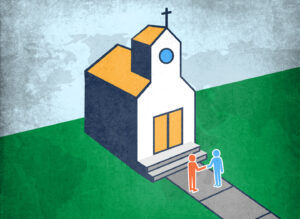I was in the driveway when my sister found me unconscious. I was scraped off the cement and hoisted into the family car and rushed to the hospital. I had suffered from Grand Mal seizures from birth and that day was a scary one. I was in a seizure induced coma; it was the worst fear of my parents. Once at the hospital, they were told by the doctors there were two ways this could go; I could wake up a vegetable for the rest of my life, or not wake up at all—I could die.
Scared, dad called the preacher who came right away. He was a big guy with overalls and a large jug of oil. He came into my hospital room, towered over me, and with a southern drawl began to pray. He prayed that God might revive me, that He would restore me and give me back my life—all while drenching my head and body with oil.
Even though my father cannot recall the preachers name, he can recall his love for us and the fervent, faith-filled prayer that came from his heart. I am thankful for that preacher. I am thankful that He cried out to God on my behalf and God heard him, answered him, and returned my life to me.
It is this kind of acute sense of urgency that is needed today in our outreach to the nations. Understanding that all people of all nations have a very grave problem—a life-threatening situation that without intervention will result in eternal death.
Would I have made it this far without the community God has always provided to surround me and support me? Not a chance.
I don’t know what would have happened if my sister had not found me in time. If there were no family to rally around me and support me. Without a faith–filled preacher running down the street with a jug of oil to cry out to God on my behalf I may have been lost forever.
Frankly, I worry about what will happen to those people in desperate situations all around us. Will they have someone who will find them in their acute, dark, and hopeless circumstance and lift them up and take them to a place of hope?
Will they find in our churches a spirit-driven love and a well-planned strategy to care for them?
In my recovery, there was a team of people beside me. From the day the preacher opened his heart to my dad and me—to my parents, family, doctors, nurses, specialists, and schoolteachers—it was evident that an amazing community surrounded me. Although God decided I should live, His community of people are what helped me become a healthy, thriving, and active young man again.
Would I have made it this far without the community God has always provided to surround me and support me? Not a chance.
When we speak about ‘Reaching the Nations’, it must be more than just a space. It must be a purposeful, intentional, and spirit-driven approach.
Reaching lost people groups in the state of Colorado and around the world means showing up in difficult situations with a cruet of oil, a willing disposition, a submitted heart, and a spirit-filled cry to God on behalf of the nations.
So where can we start? Here are five ways we can begin to reach our multi-ethnic churches:
SHARED MISSIONS (reach the lost together)
Our Great Commission and Great Commandment practice is a shared practice. Inviting a language pastor or church planter into our church buildings is only the first step and often has been the last step. Shared missions means going beyond providing a space for disciple-making to happen. Developing a shared philosophy of missions together where there is an investment from everyone is key to establishing a welcoming, warm, and supportive environment for unity and growth to flourish.
- Sit down with your staff and develop a mission philosophy that connects your church to your community. How will all pastors and staff engage the lost in all languages? How will church members engage with one another for mission? How will we model this for all languages we wish to represent.
- Language pastors and their leaders can also help reach English speakers and be a part of your outreach efforts to the community.
- How will you connect to your schools, business owners (many who are international business owners), and organizations in your community while thinking about all people groups?
- What does prayer look like in your church? Can you organize and enjoy prayer together around your mission? What does that look like?
SHARED MINISTRY (care for the sheep together)
Caring for God’s people and leading them into a deeper, fuller, relationships with God is not limited to one language. It happens in Christ’s church in every language and in many ways. Having a philosophy of ministry can help clarify how we can work together and find unity and commonality despite language barriers.
- Meet together to discover things that can be shared and create a ministry philosophy that will promote a continual and engaging flow of ministry for all people groups.
- What better way to comprehend and celebrate our Savior than to celebrate the Lord’s Supper together?
- Share in the stewardship of what God has given you financially. How can we jointly care for the building that has been entrusted to us? How should we use our tithes and offerings together?
- Disciple Gods people together. How can we share in our discipleship efforts? Is there material that is written in all the languages represented that can be studied, fleshed out, and applied in your church?
- Joint youth groups work well. Children’s ministry can be a thriving multi-ethnic endeavor with the amount of English-speaking international children coming from local schools.
SHARED LEADERSHIP (make decisions together)
Leadership with different people groups is no different than adapting to different leadership styles. Everyone has contributions to make but ultimately, we understand that God leads His church through His Spirit. Having a spirit-guided leadership team is the joy of any church.
- Spend time discussing how to share leadership roles and responsibilities. How would it look for a language pastor to have responsibilities in the English-speaking congregation? How about the opposite? How can God’s people be shepherded together? Not in a token way but in a real and tangible way?
- Ask, what does spiritual growth look like in our leadership? Can we read the same books, discuss the same leadership material, go to the same conferences? Grow together as leaders?
- What does mentorship look like? Is there a leadership strategy to grow up future leaders and multiply church planters and future pastors? In what languages can we do this? What kinds of goals can we set our minds on?
- Plan your preaching calendars, topics, and scripture passages together. Ensure the people of God are moving in the same direction at the same time. This can be incredibly unifying.
- Ensure every leader, both international and local, has a weighted investment in the future of the church. What kind of intentionality needs to be agreed upon and written down for that to happen?
SHARED WORSHIP (gather together)
The exaltation and worship of God is one of the most essential parts of our church gatherings. Imagining together a Revelation 7:9 environment where God is glorified in ALL His creation standing before Him worshipping Him for all eternity—starting today.
- Plan monthly worship together, you won’t regret it! Discover the beauty of language while being joined in hearts and minds in the same room for the same reason—the exultation of the King!
- Share musicians, choir members, music sheets, licensing, and equipment.
- Budget for and train new musicians and worship leaders together and multiply the worship of God whenever and however you can—in every language you can!
- Although it might take some work…you could start a multi-lingual choir for outreach in parks, recreation centers, and other events.
SHARED FELLOWSHIP (eat together, play together, serve each other)
Koinonia! That famous word that we often use. Merriam-Webster defines it as, “intimate spiritual communion and participative sharing in a common religious commitment and spiritual community”. In the New Testament Greek Lexicon – NAS, the key words are “joint” and “participation”. There is contribution from all parties and there is intimacy among God’s people and with God.
- Make fellowship super intentional! Ask two questions. First, “What does God-honoring KOINONIA look like?”. Study it, ponder it, meditate on it, pray about it, and then come together and answer that question together. Then ask a second question, “What will it take for us to achieve a true, “all hands on deck”, God honoring KOINANIA?
- Write down a comprehensive vision, assign leadership to it, release financial resources for it, and set goals to achieve it.
- Make common components of fellowship a priority.
- Eat together often. I honestly don’t think the church would be anywhere today if we had not gathered to eat as often as we have! Jesus and His disciples had lamb, fish, bread, wine and so much more together. Go beyond eating—learn to cook meals together that represent the nations you are reaching. From brisket to pork belly, corned beef to tamales, enjoy what God has provided—together, for His Glory. (1 Corinthians 10:31, Acts 2:46-47)
- Pray for each other,
- Support each other financially, emotionally, and spiritually.
- Play together. Design family camps and churchwide events for total participation. frisbee golf, soccer (Futbol), one-legged races, and egg tosses are multi-national sports!
- Care for the sick together. Encourage language pastors and church members to care for people outside of their own language group as well.
Just like that preacher came running down the street with a jug full of oil and poured it out on me while he cried out to God for my life, Christ is running to meet the nations and pour out His Spirit upon ALL flesh. They will need a community to grow in the grace and knowledge of our Lord Jesus Christ. A community that has a plan for unity in a disconnected world.
Will YOU be that community?
- Do you have usable meeting space but don’t know where to start?
- Are you interested in exploring a comprehensive strategy for your church?
- Do you want to connect with pastors and church planters looking for a place with a missional heart?
- Maybe you just want to start the conversation. How about coffee?
You can reach me at [email protected]
Do you know your neighbor?
We can provide a free Demographic Report to help you answer that question. Contact your Regional Director, or the CBGC Office, to receive your free Demographic Report.





